|
|
| 'Like' us on Facebook | Follow us: |
Posted on: Feb 22, 2016
 |
Part 07
 |
| Download |
Part 01 || Part 02 || Part 03 || Part 04 || Part 05 || Part 06 || Part 08
Sairam and welcome to the seventh episode of 'Satsang with a Techie'. This satsang started with an accidental meeting in a restaurant in Bengaluru between two childhood friends, Varun, a techie who lives in Bengaluru and Vivek, an alumnus of Sri Sathya Sai Institute of Higher Learning who has settled down in Prasanthi Nilayam to dedicate his life in the service of Baba. Following the chance meeting, Varun becomes somewhat curious about spirituality and agrees to come to Prasanthi for the weekend to continue his education in spirituality. During that trip Varun has His first darshan (this is set in 2009). After this, Varun and Vivek discuss many things over the next two days. Thrilled with the new paradigms that were now opening up, he comes back the following weekend. They have already had two sessions already, one in the morning and one after Darshan in the evening. Varun reluctantly breaks for dinner and now is back with more questions. Let's join the friends. |
VARUN: Sai Ram Vivek! Can we get started? I am dying to!
VIVEK: Why not? Go right ahead, and ask what you were about to.
VARUN: Thanks. Before we broke off this morning, we were talking about three types of genes associated with the three major constituents of a human being.
You said that while the gross body came from the biological genes, and the Divine Spark has its origins in the Divine Genes that came directly from God, the Mind came from something you called Vasanas. That was where we had to stop, and I would like you to pick up from there.
One thing you said was rather intriguing. You remarked that while the bio genes came from parents and ancestors, and while the Divine Genes [as I described it] came from God, the Vasanas or Mental Genes came from us.
VIVEK: That’s right; I did say something to that effect.
VARUN: OK, we agree thus far; but this exactly is where I have a problem.
VIVEK: What’s that?
VARUN: Listen. Gene is a sort of micro, a seed if you will, from which something macro emerges. If you say Vasanas form the Mental Genes and come from us, I wonder how it could have existed before we were born. I mean you can’t have something called genes taking shape after birth, can you? It must in some way pre-exist birth and have a source.
My problem is: Where were my so-called Vasanas, before I was born? You see my point?
VIVEK: [smiles] I see your difficulty, and the point you make is a good one too.
VARUN: OK, in that case, go ahead and answer my question.
VIVEK: Sure will. You see Varun, we all are so much focussed on the body which we now have that we forget something very important.
VARUN: Which is?
VIVEK: Which is, that we have been here before many times.
VARUN: Sorry, I don’t read you.
VIVEK: OK; do you mind if I quote a poem by the famous Sufi poet Rumi?
VARUN: I certainly do not, if it would help you to explain my doubt.
VIVEK: Very well then. Here is what Rumi said in part.
I died a mineral and became a plant.
I died a plant and rose as an animal.
I died an animal and was man. ………
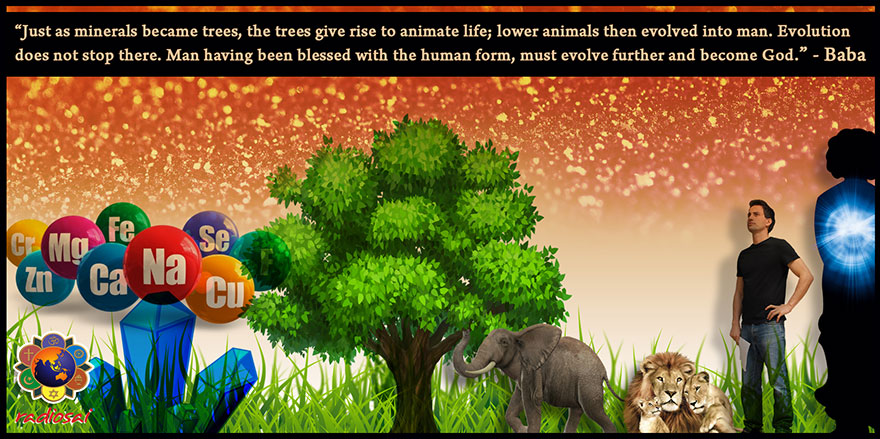 |
The poet goes on in this vein, and what he is trying to say is that each of us goes through many lives, some of the earlier ones being associated with lower forms, that is to say, as animals of various kinds.
VARUN: Sorry to disappoint you, but I am still not able to read you!
VIVEK: That is because I have not finished yet!
Let me now offer you a quote from Swami, who says pretty much the same thing but adds something more, which is very important and central to our discussion.
VARUN: What is that?
VIVEK: Swami says:
Just as minerals became trees, the trees give rise to animate life; lower animals then evolved into man. Evolution does not stop there. Man having been blessed with the human form, must evolve further and become God.
VARUN: OK, but what has all this got to do with what you referred to as Mental Genes?
VIVEK: Hold on please! I am coming precisely to that. You see my dear friend, right now you and I, each of us have a body that is unique to us as individuals, and seems very real to us. In an empirical sense, it sure is. But what we must not forget are two important facts related to the body we now possess.
VARUN: And those facts are?
VIVEK: Firstly, aspects of this body have come from bodies that have existed earlier, and that fact has a great bearing on our current personality. Secondly, and this is very important, having been blessed with a human body presently, we must use this life to move continuously forward to become more and more Godly.
VARUN: Boy! You sure are making my head spin! Can you explain all that slowly please, so that I can understand?
VIVEK: Of course. The famous Physicist Steven Weinberg once said: “The more the Universe seems comprehensible, the more it also seems pointless!”
You are a techie; do you believe that? Do you believe that life has no deeper meaning and purpose? If God exists, as I presume you believe, do you really think that God created this beautiful Universe and put us all in it with absolutely no purpose whatsoever?
VARUN: Look! You are asking a rather unfair question. Here I am, an absolute rookie to Spirituality; what do you mean by bowling a nasty bouncer like that?
VIVEK: Varun, I am not trying to browbeat you or put you down. All I am doing is to ask a fundamental question that happens to be extremely crucial at this point of human history.
VARUN: In what way is your question so important? First explain that to me.
VIVEK: Sure will. You agree, don’t you, that humans have unleashed the forces of Science and Technology to an unimaginable extent?
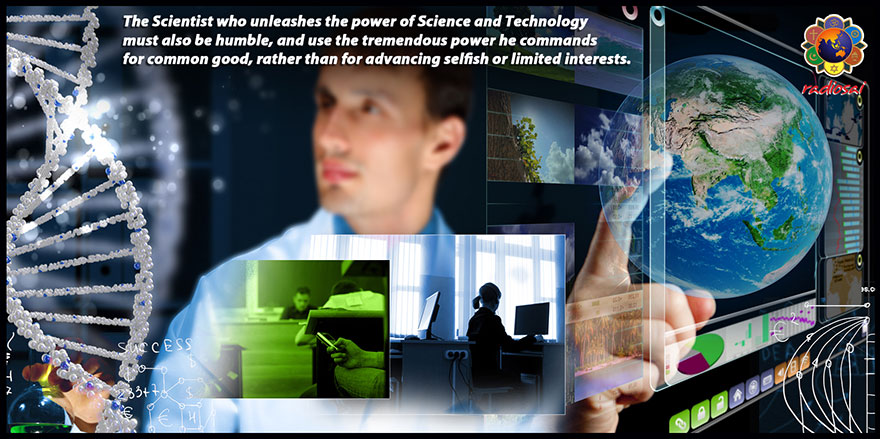 |
VARUN: Of course they have, and what are you complaining about? Can you not see the huge gains made and the tremendous good that has come out of it?
VIVEK: Did I deny that? But at the same time, do you not agree that he who unleashes the power of Science and Technology must also be humble, and use the tremendous power he commands for common good, rather than for advancing selfish or limited interests?
VARUN: Look! Frankly, I do not know what you are talking about! Did we not agree just a moment ago that S and T have done much good? I mean, just look at the world of medicine; can you not see how many millions of lives are being saved by Science and Technology?
VIVEK: I entirely agree with that, but don’t you agree that there is also a lot of misuse of S and T that is going on at the same time?
VARUN: Yes there is, but you cannot blame it entirely on scientists and technologists alone; plenty of others also are involved as well.
VIVEK: I agree with that, but what happens when brilliant scientists like Weinberg start saying that life has no purpose and stuff like that?
VARUN: Why are you bothered what he says? Let him, who cares?
VIVEK: No Varun, things are not as simple as you make it. Great achievers also become role models to many, especially those who wish to emulate them. If thousands of young men and women who want to become great scientists start thinking in this manner and believe that life has no purpose, then not only would life become totally rudderless for them, but they would even be prepared to sell their talents without any consideration to the consequences.
VARUN: I do not follow.
VIVEK: Let me give an important example. I am sure you know about the atom bomb.
VARUN: Who does not?
VIVEK: OK, you must have also heard about the hydrogen bomb, right?
VARUN: Of course; a hydrogen bomb actually requires an atom bomb to get triggered or fired.
VIVEK: Now, people already knew from Hiroshima and Nagasaki that the atom itself was deadly. Why on earth did they then go about inventing the hydrogen bomb, which could be anywhere from ten to a hundred times more devastating than the Hiroshima-type of bomb?
VARUN: I was not born then, but I heard it was all due to the so-called Cold War.
VIVEK: You are right. World War II ended in 1945. However, almost immediately began the famous Cold War between the erstwhile Soviet Union and the Western powers, and it lasted till the Soviet Union finally collapsed around 1990, literally overnight. Mind you, during the Cold War, there was actually no real fighting between the two Super Powers but plenty of tension. And it was as a result of this tension that both powers went for the hydrogen bomb.
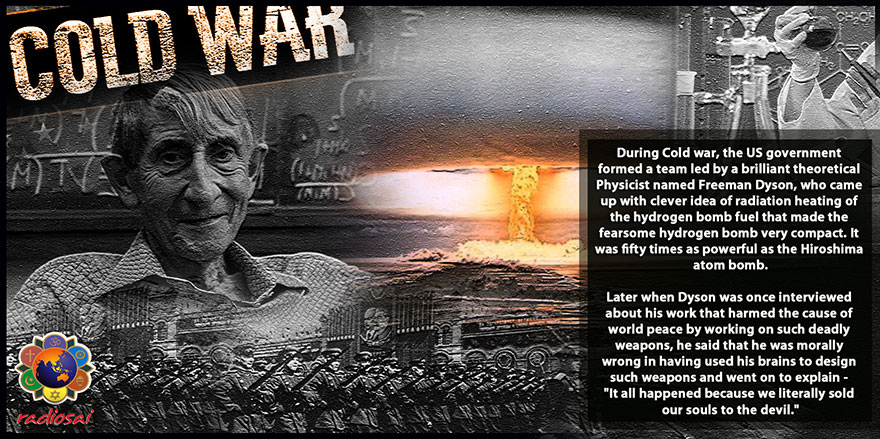
VARUN: OK, you have told me a bit of history; but what has all that got to do with the point we were supposed to be discussing?
VIVEK: Ah, I am coming precisely to that! With the Cold War becoming intense, the military in America lobbied hard for the hydrogen bomb, and sure enough its development was soon authorised. However, the very first design, while it did prove the concept, was big, uncouth and too clumsy for tactical military use. Somehow, the bomb design had to be significantly improved to make the h-bomb both small and “efficient”.
VARUN: So what happened then?
VIVEK: Well, the human brain being fertile, many bright young scientists came forward with ingenious concepts for making the h-bomb compact. Thus, a vigorous thrust was made in developing what might be called a new and improved design.
VARUN: That sounds very much like a toothpaste or soap ad!
VIVEK: That was the way the military and the hawks sold the development idea to the government.
VARUN: What did the government do then?
VIVEK: They formed a new, young team led by an absolutely brilliant theoretical Physicist from UK named Freeman Dyson to do the development, and Dyson came with up clever idea of radiation heating of the h-bomb fuel. In a nutshell, that made the fearsome h-bomb very compact. I mean a bomb fifty times as powerful as the Hiroshima bomb could be made as small as a say a small bucket. And in the nose cone of an inter-continental ballistic missile could be placed four to five such h-bombs, each aimed at a different target.
VARUN: Sounds pretty nightmarish no doubt, but why are you telling me all these? Have we not drifted somewhat from what we were discussing earlier?
VIVEK: There is a specific point I am trying to make. You see, years after all this happened, Dyson was once interviewed about his work and asked, “Don’t you think you harmed the cause of world peace by working on such deadly weapons? What made you do so?”
VARUN: And what was Dyson’s reply?
VIVEK: He admitted that he was morally wrong in having used his brains to design weapons that were far more deadly than those that were designed before.
VARUN: Being a very intelligent man, Dyson must surely have known what he was getting into. Surely, there must have been at that time, plenty of people strongly opposed to nuclear weapons; and yet, he got involved in such work; why?
VIVEK: That really is the key question, is it not? By the way, soon after the War, many physicists who earlier worked on the famous Manhattan Project in America where the first atom bomb was developed felt a deep moral objection to nuclear weapons and quit weapons work, even though there were plenty of job opportunities. They all went back to universities to become teachers and professors. Moreover, Albert Einstein and Bertrand Russell led a strong global anti-nuclear weapons movement in the fifties till they passed away. So, it was not as if all scientists got seduced shall I say, by the glamour of developing “bigger and better weapons”.
VARUN: So, it all comes back, does it not, to the question why such a brilliant man like Dyson, a giant in his field so to say, became involved in such a dreadful activity?
VIVEK: Dyson himself gave the explanation later. He said, “It all happened because we literally sold our souls to the Devil!”
VARUN: You mean he was attracted by the scientific challenges and the excitement the work offered?
VIVEK: That’s right. You see Varun, for many great scientists, problems and challenges are like magnets. They easily get attracted by puzzles, unsolved problems and intriguing questions because these challenge them and bring out the best of their originality, creativity, etc.
VARUN: But what about the consequences of what they are doing? How can intelligent people be indifferent to that?
VIVEK: Ah, that exactly is where Spirituality begins to tangle with so-called daily and ordinary life. By the way, for the record I should mention that at the time of the Vietnam War which was fought between the late sixties and early seventies, the defence establishment in America poured money into the development of all kinds of deadly but conventional weapons, and a lot of this research took place on university campuses. Many professors went for it because it meant cushy research grants; however, there were also professors who swore by their Conscience and refused to touch such money, even though it meant a lot of hardship for them in many ways; they even had to bear a lot of insults, being called unpatriotic and all that, but they remained steadfast to their ideals.
VARUN: Which was?
VIVEK: Their point was simple. Students come to a university to learn. Their duty as teachers was to shape the minds of students in such a way that they acquired knowledge and later used it for purposes that were beneficial to Society, not to wage war, find efficient ways of destroying fields and farms, kill people in large numbers, and so on.
VARUN: I think you have made an important point and I really need to let this sink in for a while before responding. Meanwhile, anything more you have to add?
VIVEK: Yes, just one thing and after that we can swing back all the way and link what we are now talking about to what we were discussing earlier.
VARUN: And what is this other thing you want to mention?
VIVEK: Vicky. I want to draw attention to an important remark that Prof. Victor Weisskopf of MIT once made, during an address he gave before the American Association for the Advancement of Science.
VARUN: What was it that this Prof. Weisskopf said?
VIVEK: Before I quote that, I should perhaps mention that this professor came from Austria in the thirties – he was a Jew and sought to escape from Hitler’s long arm. He came to the US and during the war, and worked on the atom bomb project. After the war, he became a full-time academic and stayed away from military research.
VARUN: I see. I am anxious to hear the quote of Prof. Weisskopf.
VIVEK: I am coming to that. The professor said: “Knowledge without compassion is inhuman while compassion without knowledge is ineffective.” I should add that by knowledge, the learned professor meant scientific and technological knowledge.
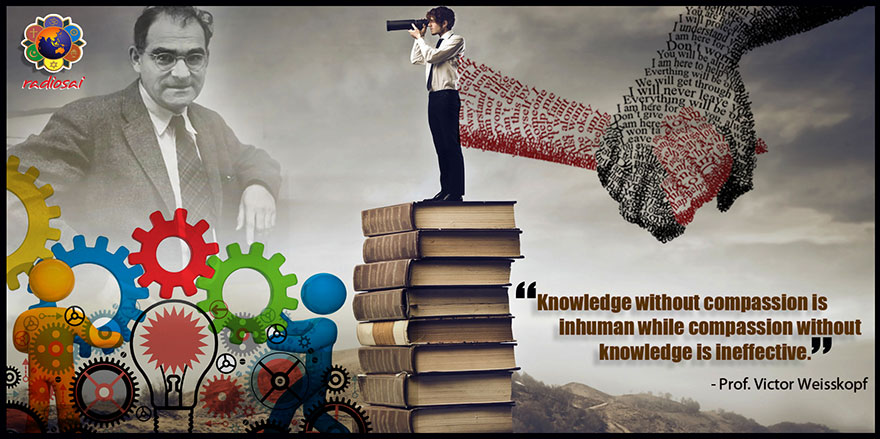 |
VARUN: That is an interesting and a profound remark too. I sort of understand the first part; basically, it is a strong warning not to misuse scientific knowledge.
VIVEK: Correct, and that was the sort of thing Dyson admitted he did, misled by false values, ideas and of course the dubious excitement that the project offered.
VARUN: But Vivek, what does the professor mean by saying compassion without knowledge is ineffective? I do not quite follow.
VIVEK: Actually, that is an important point. Let me give the example of what often happens in villages. As you know, snakebites are quite common in most of our villages, especially the small and remote ones. The proper thing to do is to immediately take the victim to the nearest hospital. However, being ignorant, most villagers take the victim to some kind of a tantric, who is often a witch-doctor kind of fellow.
VARUN: You mean their sense of compassion makes these poor and ignorant villagers want to help but lack of scientific knowledge makes them do the wrong thing.
VIVEK: That’s exactly right.
VARUN: You know, we have wandered quite a bit, and I would like to pause and sort of take stock of what we have discussed thus far.
VIVEK: That’s a very good idea. If you recall, it all started with the three basic entities a human being is made up of, the gross body, the subtle Mind and the Atma.
VARUN: After that you identified three kinds of genes associated with these three components. These were: the biological genes that were associated with the physical body, the Vasanas associated with the Mind, and finally the Divine Gene that can be linked to the Atmic aspect within us.
VIVEK: Good job! That was a crisp and correct recall.
VARUN: Thanks. After you brought up the Vasanas, somehow we seemed to have wandered off into h-bombs and that kind of stuff. Take me back to the Vasanas and link it up to the Mind please.
VIVEK: I shall and that is an important link by the way. As I told you, according to Vedanta, a human being takes birth after death; and when he or she does so, the person brings into the new birth behavioural tendencies acquired in the earlier birth.
VARUN: I need some elaboration please!
VIVEK: Here is how the Vasanas thing works. Let us say there is a person who is prone to being rather short-tempered. That person dies and is born again. In this new birth, the body might be different but the behavioural tendency of the “new” person would be based on what the person was like in earlier birth.
VARUN: You mean this person would have a strong tendency to get angry at the drop of hat?
VIVEK: Yes, the person would have an in-born tendency shall I say, to blow his fuse rather easily.
VARUN: So the Vasanas get passed on from birth to birth like a baton is during a relay race?
VIVEK: Yes, it is something like that.
VARUN: But what if the person says, “I don’t like this short temper; I shall do all it takes to get rid of it.” In that case, in the next birth, the person would not have this excess baggage.
VIVEK: You are absolutely right; realising his deficiency, the person in this case makes a strong effort to refine himself or herself as the case may be.
VARUN: I guess you would now say that all this is related to something you mentioned earlier, namely that having been blessed with a human body presently, we must use this life to move continuously forward to become more and more Godly.
VIVEK: Exactly! So you see, seen from this perspective, the Universe is not without a purpose, as Steven Weinberg feels.
VARUN: Can you please tie up the various bits we have gone through so far, so that I get an integrated picture of all that we have been discussing in this session?
VIVEK: Sure. Let us start with Weinberg’s remarks that though we are able to understand quite a lot of the Physics of the Universe, yet, it seems to exist without a purpose. That is because Weinberg probably does not believe that there is a God who created this Universe or willed its existence if you want it that way.
VARUN: Are you saying that the purpose of the Universe can be understood only when we bring in God the Creator?
VIVEK: Absolutely. God is the Creator, and all of us including you and me, form a part of Creation. Whether we like it or not, there is an intimate relationship between the Creator and the Creation. Unless we understand that, we cannot see any purpose in the Universe.
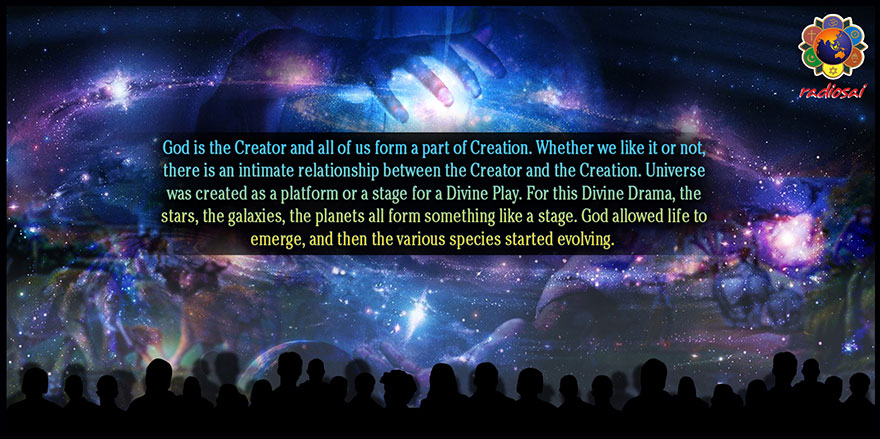 |
VARUN: OK, I agree that there is a Creator behind Creation. Why did God create the Universe?
VIVEK: Now that is a good question. There are various ways of answering that and I shall follow one particular line that is appropriate for our present discussion.
VARUN: Which is?
VIVEK: I would say the Universe was created as a platform or a stage for a Divine Play. For this Divine Drama, the stars, the galaxies, the planets all form something like a stage. God now allows life to emerge, and then the various species start evolving.
VARUN: So, we have life going through all forms, from the very primitive molecule with attributes called life – whatever it is – to primates; right?
VIVEK: Correct; and then humans appear, and that is where the Drama takes an interesting turn.
VARUN: In what way?
VIVEK: You see Varun, a bee, a frog, a parrot, a tiger, etc. – all these living species know they exist; they are aware of their existence and able in some manner to relate it to world around them.
VARUN: What you are saying is that every living species is capable of the awareness that it exists and relate this awareness about self-existence to the external world.
VIVEK: Indeed. That is why when you try to say swat a fly, it becomes aware of a threat to it and flies away immediately. Why? Because it wants to protect itself; it wants to survive.
VARUN: And this, I suppose, is achieved via the senses and the brain working together.
VIVEK: That is exactly right and I believe we went through that earlier.
VARUN: OK, in what way is a human being who, according to current understanding, was the last one to emerge in this long chain of evolution of species, in what way is a human being special? Clearly there are many things special about a human being that I can understand, but from a Spiritual point of view, is there anything extra and unique?
VIVEK: Indeed, and that really is the hub of the entire discussion we are having!
VARUN: [looking at his watch] I know what you are going to say next; let’s take a break and do it all in the next session – right?
VIVEK: [smiles] You indeed are!
- Radio Sai Team
What do you think about this article? Please let us know by writing in to h2h@radiosai.org or you may leave your thoughts in the comments section. Do not forget to mention your name and country.
| comments powered by Disqus |






